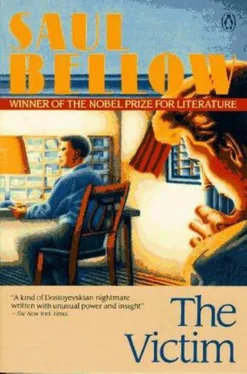Saul Bellow - The Victim
Здесь есть возможность читать онлайн «Saul Bellow - The Victim» весь текст электронной книги совершенно бесплатно (целиком полную версию без сокращений). В некоторых случаях можно слушать аудио, скачать через торрент в формате fb2 и присутствует краткое содержание. Год выпуска: 1988, Издательство: Penguin Books, Жанр: Современная проза, на английском языке. Описание произведения, (предисловие) а так же отзывы посетителей доступны на портале библиотеки ЛибКат.
- Название:The Victim
- Автор:
- Издательство:Penguin Books
- Жанр:
- Год:1988
- ISBN:нет данных
- Рейтинг книги:3 / 5. Голосов: 1
-
Избранное:Добавить в избранное
- Отзывы:
-
Ваша оценка:
- 60
- 1
- 2
- 3
- 4
- 5
The Victim: краткое содержание, описание и аннотация
Предлагаем к чтению аннотацию, описание, краткое содержание или предисловие (зависит от того, что написал сам автор книги «The Victim»). Если вы не нашли необходимую информацию о книге — напишите в комментариях, мы постараемся отыскать её.
The Victim — читать онлайн бесплатно полную книгу (весь текст) целиком
Ниже представлен текст книги, разбитый по страницам. Система сохранения места последней прочитанной страницы, позволяет с удобством читать онлайн бесплатно книгу «The Victim», без необходимости каждый раз заново искать на чём Вы остановились. Поставьте закладку, и сможете в любой момент перейти на страницу, на которой закончили чтение.
Интервал:
Закладка:
To himself he said, “A lot a dirty drunk like that would know about a woman like Mary.”
18
THE dark came on. He did not light the bed lamp but sat, still with the cards in his hand, waiting for Allbee, listening for footsteps and hearing instead a variety of sounds from below, the booming of radio music through the floor, mixed voices, the rasping of the ropes in the dumb-waiter; the cries of boys scudding down the street rose above the rest, as distinct as sparks from fire. With the setting of the sun, the colored, brilliant combers of cloud rolled more and more quickly into gray and blue, while red lights appeared on the peaks of buildings, pilot warnings, like shore signals along a coast. The imperfections of the pane through which Leventhal gazed suggested the thickening of water at a great depth when one looks up toward the surface. The air had a salt smell. A breeze had begun to blow; it swayed the curtains and rattled among the papers on the floor.
After a time, Leventhal held his wrist up to the faint, gold bits of light under the window and studied his watch. It was well past eight; he had been sitting for more than an hour. He looked meditatively into the street. His first anger had passed over. From waiting to confront Allbee, he had lapsed gradually into a state of inert rest and now he felt hungry and got up to go to dinner. No use waiting for Allbee, who was probably drinking up the last of the five dollars in some bar and was in that case disposing of himself the quickest way. It was just as well, he reflected, that Allbee had not showed up, for what he obviously wanted was to be taken seriously. Once he had succeeded in this he could work him, Leventhal, as he liked. And that, quite plainly, was his object.
The restaurant was full; there was a crowd around the small bar. He moved to the rear in search of a table. “I got customers next at the bar,” the bony, dark waiter said, “but I’ll see what I can do for you.” He had a cup of coffee in either hand and he hurried away. Leventhal was undecided whether to wait with the others or stand at the kitchen door. It was not very likely that the waiter would give him a table out of turn if he got into the crowd. He continued toward the leaning wall of the kitchen passage. Through the arch he saw one of the cooks beside the brick oven wiping the flour from his arms and waving his apron to cool his face. Leventhal brushed against someone who seemed to have stretched an arm into his path accidentally. Without looking, he said, “Beg your pardon.” A man said laughingly, “Why don’t you watch?” And though it was peculiar that this should be said with a laugh, he did not turn but merely nodded, and he was going on when he felt his jacket being pulled. It was Williston. Phoebe was with him.
“Well, hello,” she said. “Don’t you talk to people any more?” It came over Leventhal that she was accusing him of deliberately avoiding them.
“My mind was somewhere else,” he said, his cheeks darkening coarsely.
“Sit down. Are you alone?”
“Yes, I am. They promised me a table, so don’t let me…”
“Oh, come ahead. Here.” Williston pushed back a chair.
Leventhal hesitated, and Phoebe said, “What’s the matter, Asa?” in a manner that indicated it was impossible to show reluctance for another moment without offending her.
“Oh, Mary’s out of town,” he said, “and I don’t bother too much about meals. I just run out and grab something. And you’re almost through.”
“Now sit down, will you?” said Williston.
“What does your wife’s being away have to do with it? My Lord!”
Leventhal looked at her dead-white complexion, her thick level eyebrows, and the short, even teeth her smile revealed. The noise of the place cut off their conversation for a moment. He accepted the chair, massively crowding the table as the waiter passed behind him. With an anxious face he struggled up again to catch his attention. He sat down again, telling himself not to be so nervous. Why should they rattle him? He read the menu with his hand to his forehead, feeling the heat and moisture under his fingers, and putting his swarming emotions in order. “What’s the matter; can’t I stand up to them?” he asked himself. The challenge strengthened him. When he closed the menu he was surer of himself. The waiter came up.
“What’s special?” he said.
“Soup, you want bean soup? Lasagna , we got tonight.”
“I see mussels.” He pointed to the shells.
“Very good,” said Phoebe.
“ A la possilopo .” The waiter wrote.
“And a bottle of beer; a plate of soup to start.”
“Right up.”
“I’ve been trying to reach you,” Williston said.
“Oh?” Leventhal turned to him. “Anything in particular?”
“The same matter.”
“I got your message. I was going to call back, but I’ve been tied up.”
“By what?” said Phoebe.
Leventhal considered his answer. He was unwilling to speak of his family; he did not want to appear to be soliciting sympathy, and besides he was incapable of mentioning Mickey’s death conversationally. The thought was repugnant to him.
“Oh, things,” he said.
“Labor Day pile-up, eh?” said Williston.
“That and some private things. Mostly work.”
“What are you doing with yourself over the week end?” Phoebe asked him. “Planning to go somewhere? We’re invited to Fire Island.”
“No, I’m not going anywhere.”
“Are you facing three days in town alone? You poor man.”
“I’m not what you might call alone, exactly.” Leventhal glanced at her, speaking quietly. “I have a friend of yours staying with me.”
“Of ours?” she cried. He saw that he had her off balance. “You mean Kirby Allbee?”
“Yes, Allbee.”
“I wanted to ask you about that,” said Williston. “Is he still with you?”
“Still.”
“Tell me, how is he?” Phoebe said. “I didn’t know you came about him, the other night. I wouldn’t have stayed in the kitchen.”
“I didn’t realize you were so interested.”
“Well, now I’d like to know how he is,” she said. Leventhal wondered how much of his description Williston had repeated.
“Didn’t Stan tell you?”
“Yes, but I want to hear more from you.” Her habitual cool, good temper was missing. A faint color appeared below her eyes, and he commented to himself, “Out in the open, for a change.” He delayed, thinking that Williston might intervene. The waiter put the black and green mussels before him, and he said, taking up the fork as if to weigh it, “Oh, he’s getting around.” He began to eat.
“Is he very broken up about Flora?”
“His wife? Yes, he’s broken up.”
“It must have been terrible for him. I never thought they’d separate. They started out so brilliantly.”
“Brilliant?” Leventhal thought. He paused, letting them see that the word had struck him. “What does she mean? That’s only the way women talk about marriage. What could be brilliant? He, Allbee, brilliant?” He made an indifferent movement of concession.
“I attended the wedding, if you want to know why it interests me,” she said.
“Phoebe and Flora were roommates at school.”
“Were they?” said Leventhal, somewhat curious. He poured the beer. “I met her a few times at your house.”
“Yes, you must have,” Williston said.
Phoebe for a brief moment regained her usual manner. “At the church I remember they were going to have a singer and they didn’t on account of his mother. They didn’t want to hurt her feelings. Everybody humored her about her singing. She studied in Boston for years and years. She was about sixty, and she might have had a voice once, but she certainly didn’t have one then. She sang anyway. She was bound to, at her son’s wedding. They couldn’t stop her. Poor Kirby. But the old lady was very nice. She told me she had beautiful legs when she was a girl and was so proud of them, wasn’t it a shame she had to wear long skirts? She said she was born too soon.”
Читать дальшеИнтервал:
Закладка:
Похожие книги на «The Victim»
Представляем Вашему вниманию похожие книги на «The Victim» списком для выбора. Мы отобрали схожую по названию и смыслу литературу в надежде предоставить читателям больше вариантов отыскать новые, интересные, ещё непрочитанные произведения.
Обсуждение, отзывы о книге «The Victim» и просто собственные мнения читателей. Оставьте ваши комментарии, напишите, что Вы думаете о произведении, его смысле или главных героях. Укажите что конкретно понравилось, а что нет, и почему Вы так считаете.











